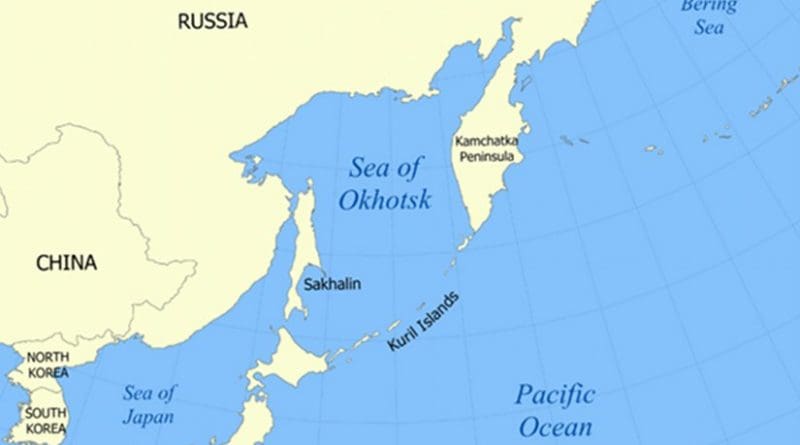Russia-Japan Deal On Disputed Islands Remains Unlikely – Analysis
When Moscow made clear on Monday that the entire Kuril Island chain would remain Russian territory, Japan quickly saw the upcoming Moscow summit meeting between Russian President Vladimir Putin and Japanese Prime Minister Shinzo Abe as perhaps more of the same that Tokyo has been suffering from since the end of the Second World War.
Moscow’s sovereignty over the part of the island chain known as the Southern Kurils in Russian and the Northern Territories in Japanese is a major obstacle in the face of a potential treaty to formally end the war between the two countries. However, amid all of the activity between North and South Korea, other unsolved and frozen wars are up for negotiation. Japan’s position is that Russia must return the seized territory before any resolution can be agreed upon. Abe expressed hope that this year will mark a breakthrough in solving the dispute and spoke about an imminent change in the islands’ status, which only angered the Kremlin.
The four disputed islands, one of which lies less than a dozen miles from Japan’s Hokkaido, are Habomai, Etorofu, Kunashiri and Shikotan, which lie in the Sea of Okhotsk in the northwest Pacific Ocean. Three are inhabited, while Habomai is a group of isles with a border patrol. Notably, Abe and Putin have met 22 times to discuss the sovereignty status of the disputed islands, with Japan repeatedly rejecting Russia’s offer — valid since the 1960s — to settle the dispute with the return of the two smallest territories, Habomai and Shikotan. Tokyo considers all four islands to be part of its sovereign territory.
At the end of the Second World War, the Kuril Islands were handed over to the Soviet Union, even though Japan laid claim to the four southernmost islands. In 1956, the two countries signed a common declaration on ending the state of war and restoring diplomatic and all other relations without a peace treaty. It said that the Soviet government was ready to hand Shikotan and Habomai over to Japan, saying that Tokyo would gain control of the islands after a peace treaty was signed.
However, during the Cold War, Japan and the US signed a Treaty of Mutual Cooperation and Security in 1960 and, consequently, the Soviet Union withdrew its obligation to hand over the islands. A Soviet government memorandum from Jan. 27, 1960, said that the islands would only be handed over to Japan if all foreign troops were pulled out of the country. Since that time, a frozen conflict has been ongoing that impacts all security actors in Northeast Asia, including China, South and North Korea, and the US.
From Japan’s point of view, it plans to receive special rights in relation to Etorofu and Kunashiri in order to expand economic activities there once a peace treaty is signed. Tokyo wants any treaty to guarantee the handover of Habomai and Shikotan, and then negotiate a deal to carry out economic activities on the two remaining islands together with Russia, and also to provide Japanese nationals with free access to the islands. Such a formula remains in the background.
However, Russia is not going to let the islands go to Japan. Moscow has four barracks on Etorofu and Kunashiri and, in 2016, it stationed anti-ship and missile defense systems on the disputed territories. In March 2018, the Russian Air Force deployed two Su-35 fighters to an airfield on Etorofu, the largest and northernmost island in the Southern Kurils, for the first time. The Japanese Ministry of Defense estimates that Russia has at least 3,500 troops stationed on the disputed islands. The Russian Navy has also been considering establishing a permanent naval base for its Pacific Fleet on one of the islands. The Russian Ministry of Defense is also seeking to deploy an army division to the islands.
Quite clearly, the historical issue regarding the Kurils as a Russian territory signals that the Kremlin has no intention to return the islands. If Russia handed the Southern Kurils over to Japan, further questions about territorial rights would emerge between Russia and Japan. Moscow is further embracing the idea that the islands are rightfully Russia’s territory. For Japan, this position means that the years of negotiations will likely never yield any territory returning to its sovereignty. Nationalist and far-right organizations will reject this position, causing a further headache for the Japanese government.
Overall, any hope of a result on the Kuril Islands/Northern Territories issue between Russia and Japan remains distant and unlikely, and they will continue to be part of the security scene in the northwest Pacific Ocean. Russia still sees Japan, at least in terms of security, as completely reliant on the US. Russia’s focus on the Arctic and the Far East is increasing, which is why Moscow’s position regarding the Kuril Islands is aimed at helping supplement the key port of Vladivostok’s place in Russia’s Pacific Ocean strategy, while also enhancing maritime trade along the Arctic shipping route. Russia’s overall strategy of using its geography, natural resource endowment and proximity of armed forces is clear to see.

